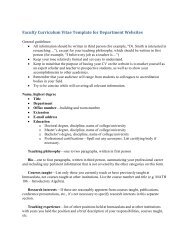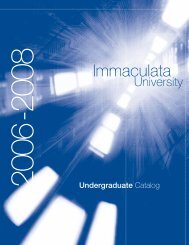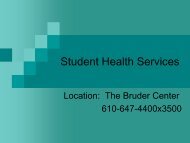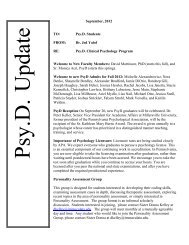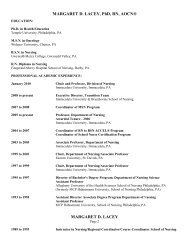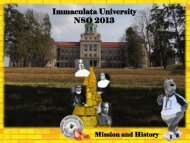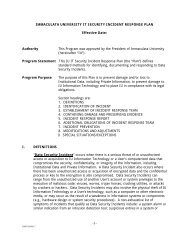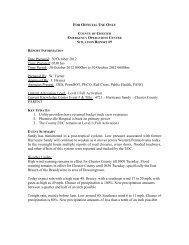Undergraduate Catalog 2008-2010 - Immaculata University
Undergraduate Catalog 2008-2010 - Immaculata University
Undergraduate Catalog 2008-2010 - Immaculata University
You also want an ePaper? Increase the reach of your titles
YUMPU automatically turns print PDFs into web optimized ePapers that Google loves.
HCM 306 Human Resource Management in Health Care<br />
Settings (3 ) (Offered only through ACCEL ® Programs)<br />
Conveys the principles of human resource management in the<br />
health care environment. Emphasizes management techniques such<br />
as interviewing, training, performance evaluation, compensation and<br />
benefits. Addresses trends in human resource management in the<br />
health care arena.<br />
HCM 311 Health Care Information Systems (3) (Offered only<br />
through ACCEL ® Programs)<br />
This course provides the foundational knowledge needed to<br />
participate in the selection, implementation and use of clinical and<br />
administrative information systems. It familiarizes the student with<br />
new and emerging software applications in the health care field and<br />
how they can be used by health care managers.<br />
HCM 312 Budgeting and Finance in Health Care<br />
Organizations (3)<br />
The course explores financial management functions at the<br />
institutional and department level. . It will review the institutional<br />
financial process. It focuses on budgeting and cost analysis for<br />
department-level operations and the accounting for capital<br />
expenditures.<br />
HCM 313 Medical Billing, Reimbursement and Insurance (3)<br />
This course presents basic history, principles, and terminology<br />
related to health insurance products in the U.S. An overview of the<br />
prospective payment system, third party payers, billing and<br />
reimbursement issues It will review the coding process and it’s role<br />
in billing.. Efficiency and equity of resource allocation as well as<br />
barriers to access in health care will be discussed.<br />
HCM 321 Leadership in Health Care Settings (3) (Offered only<br />
through ACCEL ® Programs)<br />
Students explore various concepts and theories of leadership and<br />
how these might be applied to and impact management functions in<br />
health care settings. . It will review the multiple leadership<br />
structures in healthcare organizations. Discussed are leadership<br />
versus management skills, team development, systems theory,<br />
organizational culture, and the role of the middle manager.<br />
HCM 326 Community Relations in Health Care (3) (Offered<br />
only through ACCEL ® Programs)<br />
This course delineates the dual role of the health care industry as<br />
a provider of a public “good,” while, at the same time, functioning<br />
as business enterprises. Students discuss outreach to underserved<br />
populations, health education and information, neighborhood<br />
activism, as well as marketing principles and strategies, market<br />
research, advertising and public relations.<br />
HCM 330 Health Care Information Systems and Technology (3)<br />
This course provides an introduction to the vocabulary and<br />
principles of currently utilized computerized health information<br />
applications. Health information records, including their use,<br />
format, filing systems, retention, and state and federal regulations,<br />
will be covered. Issues such as confidentiality, liability, software<br />
and hardware requirements, and network communications are<br />
discussed Current applications will be examined to determine their<br />
current and future impact on health care delivery in the U.S.<br />
HCM 335 Health Care Issues of Aging (3)<br />
This course introduces students in health care-related fields to<br />
individual and social issues related to aging in the U.S. Changes<br />
associated with aging (physiological, psychosocial, and economic),<br />
health-related issues and outcomes, and means of health promotion<br />
in this population are presented from multiple perspectives. Quality<br />
of and access to health care for this age group are examined as well<br />
as services for the aging locally and state-wide. Issues related to<br />
aging from a global perspective are also addressed.<br />
HCM 336 Pharmacology for Allied Health Occupations (3)<br />
This course provides a general overview of the basic principles<br />
of pharmacology, commonly used drugs, major drug classifications,<br />
indications, methods of administration, effect on body systems, and<br />
major adverse effects. Basic terminology and abbreviations will be<br />
covered. Issues surrounding current and future concerns in relation<br />
to certain medications will be discussed, including drug/substance<br />
abuse, price of new drugs, and new advances in drug development.<br />
This will include a review of National Patient Safety Goals in<br />
relation to Pharmaceuticals and the role of the FDA (Food and Drug<br />
Administration). (Prerequisite BIO 111 and BIO 207)<br />
HCM 340 Legal and Social Aspects of Health Care Provision (3)<br />
(Offered only through ACCEL ® Programs)<br />
Students become familiar with the legal and ethical issues in the<br />
delivery of health care services and the social environment in which<br />
health care is provided. In addition to aspects of the law pertaining<br />
to negligence, contracts, consents, confidentiality, privacy, risk<br />
management and medical research, students investigate the<br />
implications of the socio/economic status of patients, demographics,<br />
and health insurance/payment policies.<br />
HCM 341 Health Policy and Law (3)<br />
This course provides an overview of U.S. health policies and<br />
laws, at the federal, state, and local levels, and their application<br />
relating to the operation of health care systems and management of<br />
personnel. Philosophical, ethical, liability, and economic aspects of<br />
health policy and law, as well as current topics in health care<br />
reform, are examined. The roles and responsibilities of health care<br />
managers within this context will be explored as the student<br />
analyses real cases.<br />
HCM 398 Seminar: Health Care Planning and Evaluation (3)<br />
This course provides theoretical and historical foundations of<br />
health planning and evaluation of health care organizations. Legal,<br />
social, economic, ethical, and business considerations are discussed<br />
in terms of their influence on decisions about health and health care<br />
marketing and delivery. The student will generate a basic business<br />
plan. (Prerequisite: HCM 341).<br />
HCM 399 Health Care Practicum (3)<br />
This capstone course provides an opportunity for the student to<br />
integrate and utilize health care management knowledge and skills<br />
in a work environment approved by the <strong>University</strong>. The practicum<br />
involves a total of 80 hours of practical experience in a health<br />
care agency, determined mutually by the student, her/his faculty<br />
advisor, and a preceptor at the agency. The student also completes a<br />
health management project as part of the course. (Prerequisite:<br />
HCM 341)<br />
ALLIED HEALTH SCIENCE<br />
ALH 100 Observations in Allied Health and Portfolio<br />
Preparation I (1)<br />
This course is the first in the series of major courses/seminars for<br />
allied health majors. Students will be oriented to the curriculum<br />
and to the allied health disciplines, including the collaboration with<br />
Lancaster General College of Nursing and Health Sciences and<br />
Thomas Jefferson <strong>University</strong>. Students will be coached on<br />
professional preparation in anticipation of applying for their clinical<br />
71




